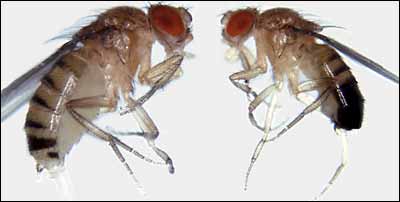6.27.2008
Controlling Enzyme Production in Brain may Slow Brain Aging
>


Research in fruit flies has shown that increasing the production of a substance called neprilysin can reduce the formation of plaques and delay neuron death associated with Alzheimer's. However, a side effect is a shorter lifespan.
Scientists believe that the buildup of amyloid protein plaques within the brain is a major signpost of Alzheimer's and contributes to disease progression. In normally functioning brains, enzymes are expected to clear the plaques. However, deficiencies in the level or function of these enzymes may be a principal disease cause.
One such enzyme, called neprilysin (NEP) decreases naturally with age and this might be a cause for age-related memory decline and Alzheimer's. Enhancing NEP production might therefore be a promising therapy, and studies in mice have suggested it has potential.
Following this hypothesis, research groups led by Drs. Iijima and Iijima-Ando in Japan attempted to test it, using transgenic fruit flies expressing human NEP and amlyoid-beta protein. NEP expression successfully did reduce plaque deposits and neuron damage in the flies, but NEP also reduced the activity of important neural proteins known as CREB proteins and shortened the average lifespan of the flies (normal flies live about 60 days) by about 10 days (although NEP-flies did live longer than those only expressing amyloid protein), or about 20%.
This study sheds light on a characteristic of normal brain aging that can be possibly delayed or reversed through enzyme-related therapy,
Source: "Overexpression of Neprilysin Reduces Alzheimer's Amyloid-β 42 (Aβ42)-Induced Neuron Loss and Intraneuronal Aβ42 Deposits, but Causes a Reduction in CREB-Mediated Transcription, Age-Dependent Axon Pathology and Premature Death in DROSOPHILA."
Labels: alzheimers, ando, flies, fruit, nep, neprilysin

